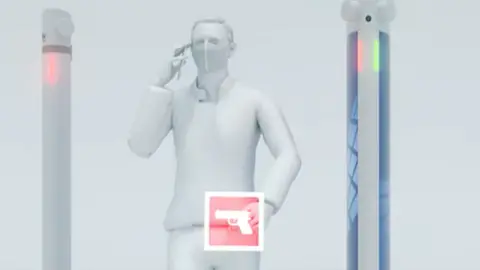An AI weapons-scanning company has backtracked on claims its technology has been tested by the UK government. Evolv Technology makes “intelligent” scanners designed to replace metal detectors by identifying people with concealed guns, knives and bombs. But the company has come under mounting criticism for overstating what the technology can deliver. Evolv told BBC News it had altered its claims about UK testing to “better reflect the process taken”. The Securities Exchange Commission (SEC) launched an investigation into the company last month. And in October the company revealed the Federal Trade Commission (FTC) was looking into its marketing practices. As well as in many large stadiums and hundreds of schools in the US, Evolv scanners are used in the Manchester Arena. The company had said that its AI weapons scanner had been tested by the UK Government’s National Protective Security Authority (NPSA) On 20 February the company put out a press release, including a claim that the NPSA was one of a number of testers who had “concluded that the Evolv Express solution was highly effective at detecting firearms and many other types of weapons”. But BBC News can reveal the NPSA does not do this type of testing. When BBC News put this to Evolv, the company said: “After discussion with NPSA, we updated the language used in the February 20 press release to better reflect the process taken.” Instead, it said: an independent company had “tested and validated” Evolv’s technology, using NPSA standards. But the UK company that did this testing, Metrix NDT, told BBC News it was “not correct to say we ‘validated’ the system”. ‘Close scrutiny’ Metrix NDT managing director Nick Fox told BBC News that Evolv’s system had indeed been tested against NPSA specifications. But when asked if Metrix NDT had found it “highly effective at detecting firearms and many other types of weapons”, he said: “It is not within our remit to pass any value judgements on the results.” Evolv told the BBC that in addition to those results, Evolv makes available to any serious prospective customer full third-party testing reports for detection performance. Prof Marion Oswald, who was on the government’s Centre of Data Ethics and Innovation advisory board until last year, told BBC News it was worrying the technology was replacing “tried and tested” security options. “It does highlight the need for really close scrutiny and potential additional regulation of companies making these types of claims,” she told BBC News. And she worried how customers might be influenced, “especially if claims are being made about how certain government bodies may have been involved”. Evolv has previously said its technology detects the “signatures” of concealed weapons. “Metallic composition, shape, fragmentation – we have tens of thousands of these signatures, for all the weapons that are out there,” chief executive Peter George said, in 2021, “all the guns, all the bombs and all the large tactical knives.” But the company has faced criticism it cannot reliably detect knives or bombs. Evolv now says it can detect “many types of knives and some explosives”. In 2022, following a Freedom of Information request by the security-analysis company Internet Protocol Video Market (IPVM), BBC News revealed that testing by a US facility had found Evolv’s technology could not consistently detect knives and certain types of bombs. Evolv should inform potential clients, the testers said. But during that investigation, in August 2022, Evolv had also told BBC News the NPSA (then called the Centre for the Protection of National Infrastructure CPNI) had tested its system. “We have tested with the UK CPNI,” a representative told BBC News. A Home Office official said: “We are looking to further understand the capabilities of weapons-detection equipment.”


